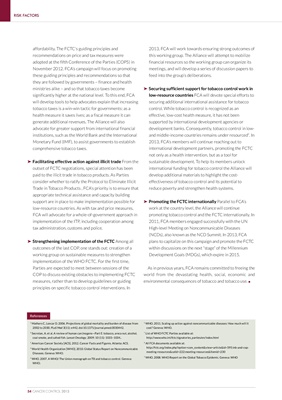
RISK FACTORS
affordability. The FCTC’s guiding principles and 2013, FCA will work towards ensuring strong outcomes of
recommendations on price and tax measures were this working group. The Alliance will attempt to mobilize
adopted at the fifth Conference of the Parties (COP5) in financial resources so the working group can organize its
November 2012. FCA’s campaign will focus on promoting meetings, and will develop a series of discussion papers to
these guiding principles and recommendations so that feed into the group’s deliberations.
they are followed by governments – finance and health
ministries alike – and so that tobacco taxes become ‰ Securing sufficient support for tobacco control work in
significantly higher at the national level. To this end, FCA low-resource countries FCA will devote special efforts to
will develop tools to help advocates explain that increasing securing additional international assistance for tobacco
tobacco taxes is a win-win tactic for governments: as a control. While tobacco control is recognized as an
health measure it saves lives; as a fiscal measure it can effective, low-cost health measure, it has not been
generate additional revenues. The Alliance will also supported by international development agencies or
advocate for greater support from international financial development banks. Consequently, tobacco control in low-
institutions, such as the World Bank and the International and middle-income countries remains under resourced9. In
Monetary Fund (IMF), to assist governments to establish 2013, FCA’s members will continue reaching out to
comprehensive tobacco taxes. international development partners, promoting the FCTC
not only as a health intervention, but as a tool for
‰ Facilitating effective action against illicit trade From the sustainable development. To help its members unlock
outset of FCTC negotiations, special attention has been international funding for tobacco control the Alliance will
paid to the illicit trade in tobacco products. As Parties develop additional materials to highlight the cost-
consider whether to ratify the Protocol to Eliminate Illicit effectiveness of tobacco control and its potential to
Trade in Tobacco Products , FCA’s priority is to ensure that reduce poverty and strengthen health systems.
appropriate technical assistance and capacity building
support are in place to make implementation possible for ‰ Promoting the FCTC internationally Parallel to FCA’s
low-resource countries. As with tax and price measures, work at the country level, the Alliance will continue
FCA will advocate for a whole-of-government approach in promoting tobacco control and the FCTC internationally. In
implementation of the ITP, including cooperation among 2011, FCA members engaged successfully with the UN
tax administration, customs and police. High-level Meeting on Noncommunicable Diseases
(NCDs), also known as the NCD Summit. In 2013, FCA
‰ Strengthening implementation of the FCTC Among all plans to capitalize on this campaign and promote the FCTC
outcomes of the last COP, one stands out: creation of a within discussions on the next “stage” of the Millennium
working group on sustainable measures to strengthen Development Goals (MDGs), which expire in 2015.
implementation of the WHO FCTC. For the first time,
Parties are expected to meet between sessions of the As in previous years, FCA remains committed to freeing the
COP to discuss existing obstacles to implementing FCTC world from the devastating health, social, economic and
measures, rather than to develop guidelines or guiding environmental consequences of tobacco and tobacco use. l
principles on specific tobacco control interventions. In
References
1. 6.
Mathers C, Loncar D. 2006. Projections of global mortality and burden of disease from WHO. 2011. Scaling up action against noncommunicable diseases: How much will it
2002 to 2030. PLoS Med 3(11): e442. doi:10.1371/journal.pmed.0030442. cost? Geneva: WHO.
2. 7.
Secretan, A. et al. A review of human carcinogens—Part E: tobacco, areca nut, alcohol, List of WHO FCTC Parties available at:
coal smoke, and salted fish. Lancet Oncology. 2009; 10 (11): 1033–1034.. http://www.who.int/fctc/signatories_parties/en/index.html
3. 8.
American Cancer Society [ACS]. 2012. Cancer Facts and Figures. Atlanta: ACS. All FCA documents available at:
4.
World Health Organization [WHO]. 2010. Global Status Report on Noncommunicable http://fctc.org/index.php?option=com_content&view=article&id=595:inb-and-cop-
Diseases. Geneva: WHO. meeting-resources&catid=222:meeting-resources&Itemid=230
9.
5.
WHO. 2007. A WHO/ The Union monograph on TB and tobacco control. Geneva: WHO. 2008. WHO Report on the Global Tobacco Epidemic. Geneva: WHO
WHO.
54 CANCER CONTROL 2013